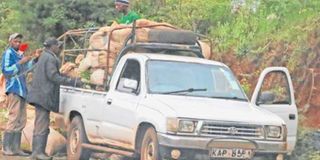Brokers eat into tea factories’ turf

A pick-up collects tea leaves from farmers at Rwathia centre in Murang’a County on June 5, 2018. PHOTO | JOSEPH KANYI | NATION MEDIA GROUP
What you need to know:
- Some farmers in Murang’a, Nyeri and Meru counties are hawking tea in exchange for quick cash.
- The buyers also allow farmers to pick more than two leaves and a bud that is normally not accepted by KTDA.
- Tea hawking is also promoting theft.
It’s a chilly Tuesday morning and Ms Regina Njoki is sitting next to a heap of tea leaves picked from her farm for sale to a broker in Murang’a County.
Accompanied by a group of men and women, they parade their sacks of tea leaves, waiting for a pick-up truck that collects their tea to arrive at Kanyenyaini trading centre.
“This is our small tea auction. We are waiting for the buyer to arrive so we can get quick money,” she says.
Ms Njoki is one of the farmers hawking their produce, which is illegal under the Kenyan law. According to the 2012 Crop Act, any person who buys, sells, exposes for sale, transports or has in possession any tea that has been grown, manufactured or is from a grower not registered with a factory or contracted to supply green leaf to it is liable to a fine not exceeding Sh1 million or imprisonment not exceeding two years, or both.
HAWKING TEA
But some farmers in Murang’a, Nyeri and Meru counties are hawking tea in exchange for quick cash.
The farmers are picking more leaf in contravention of the rules introduced by Kenya Tea Development Agency (KTDA). The allure of tea buyers is cash and volume. They pay farmers between Sh18-22 per kilo immediately after delivery of the tea leaf.
The buyers also allow farmers to pick more than two leaves and a bud that is normally not accepted by KTDA.
“We still take our tea to KTDA because there is an annual bonus, and we also get inputs like fertiliser. But selling to the brokers gives us direct money and I am able to cater for emergencies, pay medical bills and feed my children,” said Ms Milka Wangechi, a farmer.
SELLING TO BROKERS
The two farmers interviewed by the Nation had earlier delivered part of their tea to Kanyenyaini tea factory, which is affiliated to KTDA. But each had about 50 kilos extra for selling to brokers.
While KTDA promotes picking of two leaves and a bud to ensure good quality produce, the brokers are allowing farmers to pick more than five leaves. The brokers also accept tea rejected by KTDA.
“If I pick two leaves and a bud for the agency, I will get around 30 kilos, but when I am picking more leaves, I can get double the kilos and earn more,” said Mr Josephat Ndung’u, a farmer. The buyers sneak in either at night or early in the morning. The identity of the buyers is not known but they pass through numerous roadblocks and police checkpoints without any problem.
PRIVATE FIRMS
Though private firms have also been licensed to buy tea from farmers, they are required to identify themselves. However, none of the brokers identifies themselves to the farmers. For instance, the buyers of the hawked tea use the name of one of the private tea processors in Kiambu to buy the tea, creating conflict.
“These brokers are using our name to conduct their business since they know it is illegal. We have petitioned Murang’a assembly to have them kicked out of the county,” said Mr Francis Njuguna, the chairman of Kanyenyaini tea and horticulture group.
EXPLOITATION
Tea hawking is also promoting theft. Mr Njuguna said labourers employed to pick tea have been shortchanging their bosses by selling half their tea to the brokers.
KTDA National Chairman Peter Kanyago has cautioned farmers against the practice, saying buyers are exploiting them. “Tea hawking is illegal and the tea directorate should do thorough scrutiny before registering private tea processing cottages to ensure they do not continue promoting the trade,” he said.





